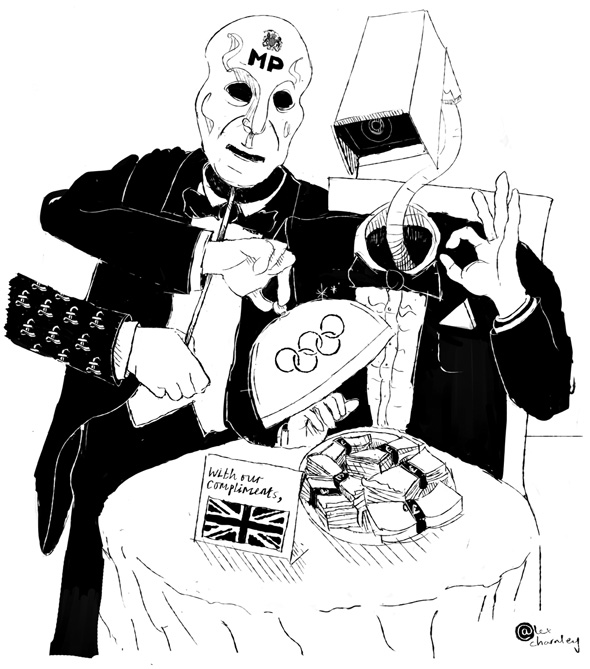
In Ancient Greece, power was centred around numerous city-states (poleis) acting as distinct political bodies. These poleis were perpetually at war with one another, but also traded together, made military alliances and integrated culturally, with resources at the centre of both conflict and cooperation.
It was in this context that the Olympics emerged, as much a political tool as a sporting competition, where poleis would push their agendas and vie for superiority. While a truce was in place between all participating poleis for the duration, political conflict continued.
The sport may be less overtly entwined with the politics than it was in ancient Greece, but London 2012 remains a facade for a turbulent political landscape. States in the midst of economic and military conflict – including Greece, Germany, Syria, Somalia, Libya, Iran and the US – will compete on London’s new corporate-sponsored playing fields, as if austerity, brutal despotism and economic imperialism are themselves worthy of celebration.
Today’s Olympics are no less a political tool. Instead of city-states asserting their dominance, the Games offer an “opportunity” for state-supported corporations to leverage even more wealth from public into private hands and to privatise and militarise our city. This is a process described by Professor David Harvey as “accumulation by dispossession”. While the majority are priced out of attending events, there are endless lucrative revenue streams for sponsors and contractors, eager to help in the gentrification of some of London’s poorest areas.
We don’t have to look very far back to see the legacy of previous Olympics. The 2008 Beijing Games left a disused tourist trap, and 2004 saw the accumulation of massive debts and a herd of white elephants in Athens. It’s likely too early to say what will happen to Beijing’s park, but Athens provides a glimpse into the relationship between the International Olympic Committee, state “restructuring” processes and areas facing notable austerity measures. Like most in recent memory, the Games in Athens ran far beyond an initial budget of €4.5 billion, with little hope of reusing the spaces. What stands now at the Athens Olympic Park may better be referred to as the site of the 2004 Neoliberal Olympics, where the International Olympics Committee, large corporations and security firms took the gold in all events.
While the story in London will be only as vivid in retrospect, the 2012 Games are already shaping up to be the perfect case study of late capitalist urban reconstruction. An accelerated process of a well-worn formula that transfers public space into private profit. The process and actors involved in this heist are global and urban in nature – and the fightback must be equally borderless and urbanised.
The Olympic park at Stratford finally allows city authorities to force through sweeping changes in its most problematic boroughs. Under the guise of “restructuring” and “development”, families are uprooted and displaced halfway across the country, and only 675 out of 1,379 homes in the East Village complex are promised as social housing. This comes when the government is cutting housing benefit and neglecting to invest in social housing; in Newham alone, around 70,000 people are on a waiting list for properties.
The darker aspects of the prelude to the Games are most apparent in the massive security operation. In what is the largest mobilisation of the military in the UK since the second World War, the city has been transformed by surface-to-air missiles in residential areas, police special forces “trained to kill”, “Good Behaviour Zones” and naval landing craft shored up on the Thames. The many security contracts issued bring the immediate cost of the security operation to no less than £550m, according to a conservative estimate. This extensive operation has brought London closer to Alfonso Cuarón’s dystopian vision in Children of Men and is suggestive of a legacy feeding into the perpetual state of the ‘War on Terror’ so desired by policy makers looking to cash in on the markets that this dynamic enables.
Instead of fulfilling claims that the Games will improve the British economy, they present instead a public short-changed in favour of the cataclysmically successful homeland securities industry. So-called ‘security solutions’ firms such as G4S have landed multi-million-pound contracts for the Games that will see the deployment of tens of thousands of personnel, including military units. Behind the facade and the fanfare, it’s nothing but business as usual – and with worldwide growth rates in homeland security of between 5% and 12% annually, the true competition in the Games is the race to this market.
In Athens, the 2004 stadia resemble modern, unused Parthenons, whilst the cradle of democracy is under a neoliberal coup. The $300m surveillance system built for the Games remains in operation, having been used recently to control protesters rising up against the tide of austerity measures imposed by today’s rulers. With the Governor of the Bank of England recently expressing renewed pessimism about the state of the global economy, concerns about the militarisation of London seem ever more prescient.
Towards the end of June, David Cameron was accused by an Olympic volunteer of “crippling the poor in London”. Cameron responded: “This is not about politics. This is about Britain. It is about volunteering. It is about our country. It is about a successful Olympics.”
While Cameron desires an Olympic ‘truce’ reminiscent of the games in Ancient Greece, the war of corporate interest against the people of Britain rages on. We must not let him pretend these Olympics are any less political than they were when they began thousands of years ago.
Illustration by Alex Charnley









